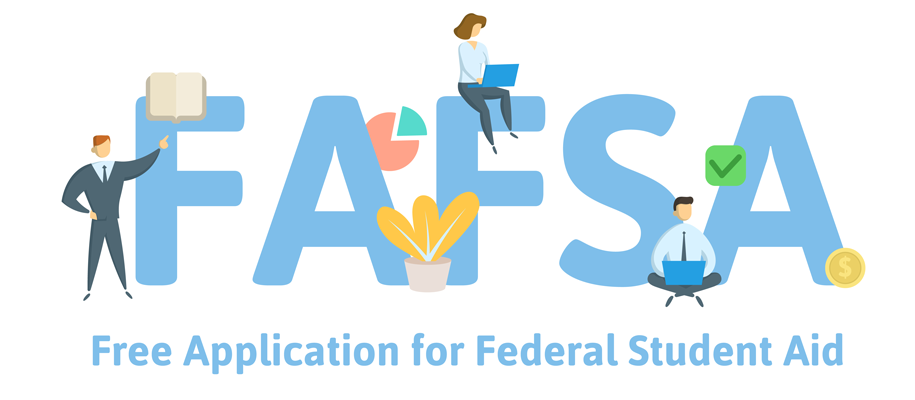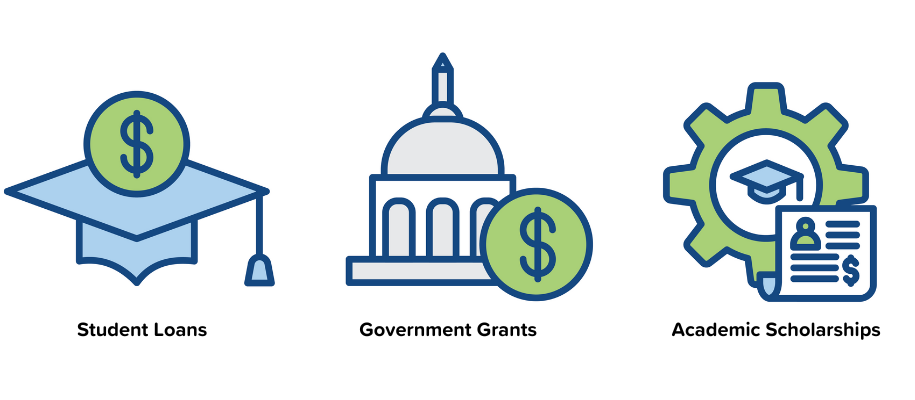In order to get the most money out of your college financial aid package as possible, you need to understand all the elements that factor into creating your package. Unfortunately, one of the hardest parts about filing for financial aid is simply understanding what all the terms and acronyms mean. To help you feel confident in your financial aid knowledge, here’s a rundown of all the important terms you need to know.
First—what is financial aid?
Financial aid is a combination of scholarships, grants, loans, and work-study opportunities designed to help students pay for college. By understanding the terms and options available to you, you can make the best decisions for your financial future.
Start scrolling to learn all about the financial aid terms you need to know, or choose a section to jump to using this menu:
- Basic financial aid acronyms (like FAFSA, SAI, etc.)
- Other FAFSA terms you should know
- Types of financial aid and savings options for college (like scholarships, grants, loans, etc.)
- Specific loans and grants available for college
- The financial "need" factor (need-blind vs. need-aware, merit-based aid, etc.)
- Terms for super-specific situations
Basic financial aid acronyms

When it comes to financial aid terms, you’re going to see a few of them abbreviated as acronyms—and you’ll see them written that way more often than not.
COA (cost of attendance)
Cost of attendance, or COA, is the amount an institution estimates it will cost a student to attend. This total includes tuition, required fees, room and board (for residential students), books, and other education-related expenses such as travel and technology. Be sure to check your school’s Net Price Calculator (required on every college website) for a more accurate estimate of costs specific to you. You can also use the College Board’s College Cost Calculator to assist with your financial planning.
FAFSA (Free Application for Federal Student Aid)
The FAFSA is the basic form you’ll need to fill out for federal and, in some cases, state and institutional financial aid. Using tax information from two years prior, you can file the FAFSA the year before you first enroll in college and then each year you attend college thereafter. The FAFSA typically opens on October 1 each year, and it’s best to complete it as close to the release date as possible since some financial aid is awarded on a first-come, first-served basis. Many colleges require the FAFSA to be submitted by specific deadlines that they set themselves, so be sure to check with your schools of interest to confirm their requirements.
For the 2024–2025 academic year, the FAFSA’s release was delayed due to the FAFSA Simplification Act, part of the Consolidated Appropriations Act of 2021. This act introduced major updates to simplify the financial aid process, such as reducing the number of questions on the form and broadening access to need-based aid. These changes required significant system overhauls, which delayed the release. To address these issues and ensure a consistent timeline moving forward, President Biden signed the FAFSA Deadline Act into law in December 2024, which mandates that the FAFSA be available by October 1 each year and requires the Department of Education to certify its readiness to meet the deadline. Thanks to this legislation, the FAFSA timeline is expected to return to its regular October 1 release starting with the 2026–2027 academic year.
SAI (Student Aid Index)
Based on your FAFSA results, you'll receive a figure called the Student Aid Index (SAI), which represents the amount the federal government determines you and your family can contribute to your education annually. Previously, this figure was known as the Expected Family Contribution (EFC), but starting with the 2024–2025 academic year, EFC was replaced by SAI. While the SAI operates under a similar concept as EFC, it includes changes aimed at streamlining eligibility for federal Pell Grants. Notably, it no longer factors in the number of students in college from a single family.
Related: Important Things to Know About Your EFC
Other FAFSA terms you should know

Net price
Net price is the actual amount a family needs to pay after financial aid has been applied. This number is often lower than the COA due to grants, scholarships, and other forms of financial assistance.
Master Promissory Note (MPN)
A Master Promissory Note (MPN) is a legal document that must be signed upon completing your FAFSA if you’re borrowing student loans. The MPN will lay out the rights, responsibilities, terms, and conditions for loan repayment.
Entrance counseling
Entrance counseling is a run-through of a borrower’s obligations as well as terms and conditions regarding a federal student loan, which is required in order to access the loan.
Prepaid tuition
A prepaid tuition plan allows you to lock in your tuition at the current price of enrollment, rather than being at risk of increased tuition over the four years of an undergraduate program. It's usually only offered at public colleges for in-state students and is typically guaranteed by the state government. Since not all colleges accept prepaid tuition plans, you should confirm with your school if this is an option for you.
Types of financial aid and savings options for college
Scholarship
A scholarship is money that’s awarded to a student based on accomplishments and does not need to be repaid. Some scholarships factor in financial need in awarding money to students, while some factor in only merit and academics regardless of need.
Related: Scholarship FAQ: The Biggest Myths and Facts
Grant
Similar to scholarships, grants are funds that don’t have to be repaid. Eligibility is determined by information provided on your FAFSA (but is not affected by other students or merit like scholarships can be) and can be funded by federal and state governments as well as the college you plan to attend.
Loan
A loan is money given to you by a state or federal government or a private lender that must be repaid, typically starting six months after graduating from college. Loans must earn a favorable interest rate and have a payback schedule to be considered financial aid. When considering loans, it's wise to compare interest rates and repayment options to ensure they align with your financial goals.
Work-study
Work-study is a type of campus employment that gives students the opportunity to work on campus and contribute to their educational or personal expenses. Some schools also offer work-study programs that allow students to be placed in off-campus employment positions. The FAFSA no longer includes a specific question about your interest in work-study. Instead, eligibility for the Federal Work-Study (FWS) program is determined based on financial need and the availability of funds at the student's chosen institution. After submitting the FAFSA, students should reach out to the financial aid office at their college to inquire about work-study opportunities. The office can provide information on available positions and the application process.
529 plan
A 529 plan is a tax-advantaged savings plan designed to help families save for future education expenses. There are two main types: College Savings Plans, which allow funds to be used for tuition and other qualified costs, and Prepaid Tuition Plans, which lock in current tuition rates at specific schools. (Note that this type of 529 plan is different than a prepaid tuition plan mentioned above, which allows you to lock in current tuition rates at certain institutions to help shield you from future tuition hikes. While those prepaid tuition plans are typically limited to tuition and fees, 529 college savings plans can be used for a range of educational expenses.)
529 contributions grow tax-free, and withdrawals are tax-free if they're used for eligible expenses. Some states also offer tax deductions for contributions. 529 plans can be used at most colleges, universities, and even some trade schools.
Related: Student Financial Aid Guide: All About Scholarships, Grants, and Loans
Specific loans and grants available for college
Direct subsidized loan
This type of loan typically does not require a borrower—you, the student—to pay interest on the loan while they’re still in school or in a grace or deferment period.
Direct unsubsidized loan
This type of loan typically offers students a low fixed rate of interest and often will come with more flexible repayment plans. Borrowers do not need to demonstrate financial need to receive this loan.
Direct PLUS loan
If the usual direct loans still don’t cover the cost of your education, a parent is legally allowed to take out a loan in their name to help their student pay for school. Parent PLUS loans require a credit check and are the parent’s financial responsibility, not the student’s.
Related: Parent PLUS Loans and Covering College Costs
Federal Pell Grant
As the largest federal grant program, Pell Grants are reserved to aid students from low-income households. In order to qualify, a student must demonstrate financial need as indicated on their FAFSA documents.
Federal Supplemental Educational Opportunity Grant (FSEOG)
The FESOG is another federal grant implemented to aid undergraduate students with significant financial need, with awards offered up to $4,000.
Iraq and Afghanistan Service Grant (IASG)
Students who have suffered the loss of a parent or guardian due to military service in Iraq or Afghanistan are eligible for this grant if they don’t qualify for the Federal Pell Grant.
TEACH Grant
This grant is offered to Education and Teaching majors (or aspiring students) who are willing to commit to teaching in a high-need education field through an educational service agency or a school for low-income students for a minimum of four years. Failing to meet the service requirement will convert the grant into a loan.
The financial “need” factor
Need
The COA of a school, after subtracting your SAI, equals your ‘need’; the remaining amount represents the financial need of the student in order to attend the school. Financial aid offices will try to meet or reduce your need through available sources of grants, loans, and/or work-study; some schools will even meet 100% of your need. This may also be referred to as "unmet need," but the concept remains the same.
Need-blind
If a school has a “need-blind” financial aid policy, it means they don’t look at a family’s ability to pay when deciding whether to admit a student, suggesting they are willing to provide aid regardless of what their financial need may be.
Related: What Does Need-Blind Really Mean With Financial Aid?
Need-aware
In a need-aware admission process, colleges consider a student’s financial need when making admission decisions. While need-blind schools do not factor in a family's financial situation when admitting students, need-aware institutions may limit the amount of financial aid available based on the student’s ability to pay. This is particularly important for students who require significant financial aid to attend.
Merit-based
This aid is provided to students regardless of financial need, factoring in academics and other extracurricular activities to award funds. Typically, the term merit-based will be in reference to scholarships but can sometimes be used in relation to grants.
Terms for super-specific situations
Judgment lien
This lien gives a creditor the legal right to keep property if the loan borrower fails to pay their debt. This means if your parents are helping you access financial aid through a PLUS loan, they will run into difficulties securing additional student aid if they have a judgment lien.
Legal guardianship
If you’re a student who is cared for by a legal guardian who is not a parent, you are not required to file your guardian’s income on your FAFSA form, which could work in your favor for getting a better financial aid package. Just ensure you provide legal documentation of guardianship to avoid complications.
Related: Understanding (and Maximizing) Your College Financial Aid Package
Now that you know these basic terms, you’ll be ready to apply for financial aid and understand your aid package when it arrives. It may have seemed like an intimidating process before, but with the right information, financial planning for college just got a lot easier.
Are you concerned about how you’re going to pay for college? Check out the “College Costs” section of our Lists & Rankings to find great values and schools that offer the aid you need.











